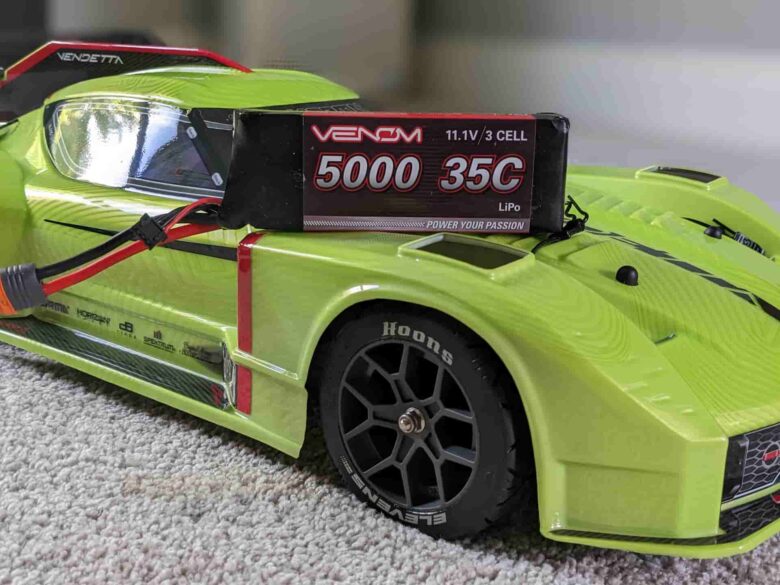Are you an RC enthusiast looking to supercharge your vehicle’s performance? The key might just lie in the power source that drives it – the battery. With a variety of options available, choosing the right battery can be as thrilling as the race itself.
In this guide, we delve deep into the world of RC car batteries, providing you with the expertise to make an informed decision that revs up your experience.
So strap in and prepare to unleash the full potential of your RC with the perfect choice.
Understanding the Types of RC Car Batteries

Source: rcgeeks.co.uk
Before diving into the specifics, let’s explore the different batteries available for your RC car. Each type offers unique benefits and drawbacks, impacting your car’s power, endurance, and speed.
| Battery Type | Description |
| NiMH (Nickel-Metal Hydride) | Known for their reliability, NiMH batteries are a staple in the RC world. Great for beginners and casual hobbyists, offering a balance between cost and performance. |
| LiPo (Lithium Polymer) | The champions of high performance, LiPo batteries provide exceptional power and speed. Require careful handling due to volatility and potential fire hazards. |
| LiFePO4 (Lithium Iron Phosphate) | Strike a fine balance between safety, cost, and efficiency, making them an ideal choice for regular use. |
| NiCd (Nickel Cadmium) | An older technology, NiCd batteries are budget-friendly but come with limitations in power and environmental concerns. |
| LiHV (High Voltage Lithium Polymer) | A newer entry in the market, LiHV batteries offer higher energy density and faster speeds but have a shorter life cycle. |
7 Factors to Consider When Choosing Your Battery
When selecting the perfect power source for your RC, it’s essential to consider various factors that impact its performance, longevity, and safety.
Here are seven key factors to guide you in making an informed decision:
Maximum Current and C Rating

Source: m.youtube.com
The C-rating reflects a battery’s ability to deliver power. Choosing one with a C rating that meets or surpasses your car’s requirements is crucial for preventing electrical damage and maximizing performance. A higher C-rating means that it can supply more power, allowing for greater acceleration and responsiveness during races.
Capacity and Endurance
The capacity, measured in milliampere-hours (mAh), determines how long your vehicle can run before needing a recharge. A higher mAh rating translates to extended run times, essential for long racing sessions or extensive practice runs. It’s the key to enjoying prolonged periods of uninterrupted driving fun.
Weight and Size
The weight and size have a direct impact on its handling and agility. Lighter batteries, such as LiPo, reduce the overall weight, enabling quicker acceleration and more agile handling, which is essential for competitive racing.
Voltage Requirements

Matching the voltage with your car’s specifications is vital for optimal efficiency. The right voltage ensures that all electronic components function smoothly, providing a balanced and efficient delivery to the motor and electronic systems.
Cost
While budget is an important factor, it’s crucial to weigh the cost against the benefits. Higher-priced options like LiPo batteries may offer superior performance and longer lifespan, making them a worthwhile investment for serious racers.
Safety and Maintenance
Safety is paramount, especially with lithium-based batteries like LiPo and LiFePO4. Proper handling, storage, and regular maintenance are essential to prevent risks such as fire hazards and to prolong their life. Adhering to guidelines ensures fire safety and a worry-free racing experience.
Charger Compatibility
The right charger plays a crucial role in maintaining their health. Different types require specific chargers, so selecting one that’s compatible is essential. A suitable charger will not only extend the longevity but will also ensure efficient charging cycles.
Matching Battery Choice with Your RC Car’s Use Case

Source: fundemoniumtoys.com
When it comes to optimizing your experience, matching the battery to the specific use case of your vehicle will make a difference. Whether you’re racing at high speeds or enjoying a leisurely drive, this tailored approach ensures that you get the most out of your vehicle.
Here’s how to align your battery choice with your model’s needs:
For High-Performance Racing
If you’re into competitive racing and need your RC to deliver top-notch performance, LiPo batteries are the go-to option. Known for their high output and lightweight properties, they can significantly boost speed and agility, giving you that competitive edge on the track.
For Regular Use and Practice
NiMH batteries are an excellent choice for everyday enthusiasts who enjoy casual driving or practice runs. They strike a perfect balance between power and safety, making them ideal for consistent use. What’s more, they are cost-effective in the long run, renowned for their durability, and require minimal maintenance.
For Brushed vs. Brushless RC Cars

Source: toptenreviews.com
The type of motor also influences the ideal choice. While LiPos can unleash the full potential of brushless motors, providing extraordinary speed and power, they might be overkill for brushed motor cars. Brushed cars, typically used for simpler and less demanding tasks, pair well with NiMH batteries as they provide sufficient power and are more forgiving in terms of maintenance and handling.
To further enhance your experience, consider visiting specialized RC shops like RC Visions. With expert advice and quality products, they can help you make the perfect choice for your specific model’s needs.
Maintenance Tips for Long-Lasting Performance
Proper maintenance is key to extending the life of your RC car battery.
Follow these tips to keep them in top condition:
Storage
Proper storage is crucial for longevity. Always store them in a cool, dry place, away from direct sunlight or high temperatures, as extreme conditions can degrade the battery’s chemistry. Additionally, for lithium-based batteries like LiPo, consider using a fireproof storage bag as an extra precaution. If you’re not planning to use it for an extended period, store it with a partial charge to maintain its health. This is especially important for NiMH batteries, which can lose capacity if stored fully discharged.
Charging Habits

Source: liveabout.com
Overcharging can significantly shorten their lifespan. Use a smart charger that automatically stops charging once the battery is full. This prevents overcharging and potential damage. For LiPo batteries, it’s crucial to use a LiPo-compatible charger to ensure safe and efficient charging. Also, avoid draining them completely before recharging, as this can harm their ability to hold a charge long-term.
Regular Checks and Balancing
Regularly inspect them for any signs of wear, swelling, or damage. Swelling, in particular, is a red flag, indicating that it should be replaced immediately. For LiPo batteries, ensure they are balanced, meaning each cell has the same voltage. Unbalanced cells can lead to poor performance and potential hazards.
Temperature
Batteries work differently under various temperature conditions. High temperatures can lead to increased discharge rates and potential damage, while cold temperatures can reduce power. Whenever possible, try to operate and charge in moderate temperature conditions.
Proper Usage
Match your usage to the specific demands of your RC car. Don’t overburden a battery with needs beyond its capacity, as this can lead to overheating and reduced life.
Final Thoughts
Choosing the right power source for your RC is a crucial step towards maximizing its performance. By understanding the different types of batteries, considering key factors like capacity, weight, and safety, and maintaining proper care, you’ll be well-equipped to make a choice that not only boosts your car’s efficiency but also enhances your overall RC racing experience. Remember, a little knowledge and attention to detail can go a long way in improving your experience.
